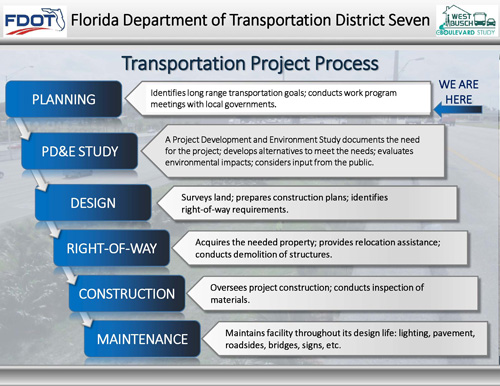A corridor study is a planning project that identifies potential improvement alternatives and analyzes their potential impacts. Corridor studies are used to:
- Define acceptable levels of access and mobility,
- Determine transportation system needs to support surrounding land uses,
- Consolidate and control access points, and
- Identify operational deficiencies and promote operational efficiency
Corridor studies are a process used within the engineering community to assess existing conditions, identify transportation-related needs for a corridor, and develop a preferred future condition. Specific benefits of a corridor study may include:
- Maximization of existing infrastructure
- Improved safety conditions
- Development of coordinated land uses
- Access or mobility improvements
- Improvements to traffic operations
- Pedestrian and bicycle enhancements
- Air quality improvements through congestion reduction
Components of a Corridor Study
Visioning and Consensus – The FDOT will work with project stakeholders to develop a shared vision that guides project goals and objectives. Having a comprehensive understanding the SR 580 corridor needs and gaining community endorsement are vital to the effectiveness of the planning, design and implementation processes.
Planning and Conceptual Design – Communities leverage local resources and knowledge to assist in guiding project activities to best meet the needs of their community. Tailoring best practices to match up with local conditions and desires will assist in developing an implementable, successful planning study.
Project Development Process
Planning – During the planning step of the process, the FDOT works with other regional agencies, such as Metropolitan Planning Organizations and Counties, to prioritize a list of short term and long term projects within the funding limitations in place.
Corridor Study – The corridor study is a process driven approach that begins with a review of the existing corridor to identify transportation-related problems. Stakeholders are engaged to assist in the development of a comprehensive vision for the corridor. A purpose and need document is developed based on this initial screening and feedback received. Once the purpose and need is established, performance measures will be established to evaluate the proposed alternatives that are developed. These performance measures will be aligned with the purpose and need elements, to objectively inform the FDOT in their selection process. Proposed alternatives are then developed that address the elements of the purpose and need and are measured in terms of the performance measures. The process ends with the FDOT selecting a preferred alternative for the corridor.
PD&E Study – A Project Development and Environmental (PD&E) is a more robust version of the corridor study that is required to comply with the National Environmental Policy Act (NEPA) of 1969. A PD&E Study is an anticipated next step to study the potential environmental impacts and right-of-way needs of the long-term alternatives.
Design – Following the corridor study, a design phase is completed. This step of the process includes the development of a set of construction plans.
Right-of-Way – If the preferred alternative identified in the corridor study does not fit within the existing right-of-way footprint, the design is followed by right-of-way acquisition phase.
Construction – This phase consists of the construction of the designed preferred alternative. The FDOT does not have construction funding included in their current 5-year work program.
Maintenance – After construction, the FDOT will maintain the infrastructure throughout the corridor, to ensure it functions as intended.

